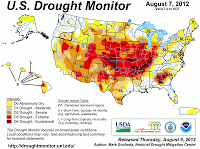 Instead of a five-year farm bill, the House passed a short-term $383 million package of loans and grants for livestock producers and a few specified farmers. The short-term package is meant to replace already expired relief programs that would have reimbursed farmers for lost livestock, aided with forage allocation and provided aid to producers of crops. But farmers and ranchers are calling for a full Farm Bill, rather than a stop-gap measure. We’ll have to wait until Congress comes back from recess in September though.
Instead of a five-year farm bill, the House passed a short-term $383 million package of loans and grants for livestock producers and a few specified farmers. The short-term package is meant to replace already expired relief programs that would have reimbursed farmers for lost livestock, aided with forage allocation and provided aid to producers of crops. But farmers and ranchers are calling for a full Farm Bill, rather than a stop-gap measure. We’ll have to wait until Congress comes back from recess in September though.
On Tuesday, President Obama held a meeting about the government’s response to the drought. He urged Congress to pass the five-year Farm Bill. Unfortunately, Congress will not be making any decisions until they come back from recess, four weeks from now. In the meantime, Obama has directed the USDA to allocate an additional $30 million to crop and livestock farmers in designated disaster areas.
Could there be a silver lining in this year’s drought? William G. Moseley, a professor of geography at Macalester College, explains that the drought has the potential to spark major initiatives in agribusiness. Our focus on corn production, he argues,results in limited crop options, soil degradation and increased drought vulnerability. Corn is a formidable and profitable presence in the global market. So, government policies promote its production. However, this has caused over-reliance on a crop that is heavily susceptible to drought. To shift America’s fixation on corn, Moseley proposes lowering floor price supports to a broader range of crops, and incentivizing mixed crop and livestock farms by giving direct payments for fodder production. He also suggests new reforms in the international food system so that it is more accessible to small businesses.
Several studies suggest a connection between the recent rise in earthquakes and hydraulic fracking. Last year, states across the Midwest endured 134 quakes. At the University of Texas, Cliff Frohlich, a senior research scientist, has published new findings on the topic. He explains that it is specifically the disposal of fracking wastewater that is correlated to increased seismic activity. Earlier this year, Ohio oil and gas regulators credited the state’s twelve earthquakes to the injection of gas-drilling wastewater into the earth.
Some farmers and crop scientists believe that climate change is an unstoppable force. So, agriculturists and consumers have to adapt to the new environment and focus on engineering hardier animals and plants designed to survive tough weather conditions. Scientists are breeding cattle with animals from Africa and India that developed a natural tolerance to drought conditions. Corn seeds are being manipulated to produce large roots that are able to absorb more water. Researchers are also trying to isolate genes that allow certain plants to recover quickly from drought. For now, it is unclear if these engineered plants can survive the most severe weather.
In Montgomery County, Maryland, the agriculture economy has certainly diminished. Thirty years ago, sales of crops and livestock totaled $537 million. In 2007, sales were reported at $37 million dollars. Many aspiring farmers are wary of starting up their own farms because of the potential for financial ruin. County officials have launched a pilot program to provide help to new farmers. The New Farmer Pilot Project will train young farmers and allow them to use privately owned land to grow sustainable crops and livestock for five years or more. Applications for the program will be accepted until September 4th.
India has also been experiencing its share of severe weather. Just a few weeks ago, government officials were reporting on the abysmal amount of rain produced during this year’s monsoon season. Indian farmers have been facing animal and crop dehydration for the last several months. To help its farmers, the Indian government has opened protective shelters for cows and are supplying several villages with drinking water. Unfortunately, now there are flood warnings throughout the country because of recent rain in Maharashtra. Citizens have asked the government for boats, life jackets, and trained swimmers to save people and cattle from overflowing waters.
A heat wave across much of Europe will also affect the global agricultural outlook.


